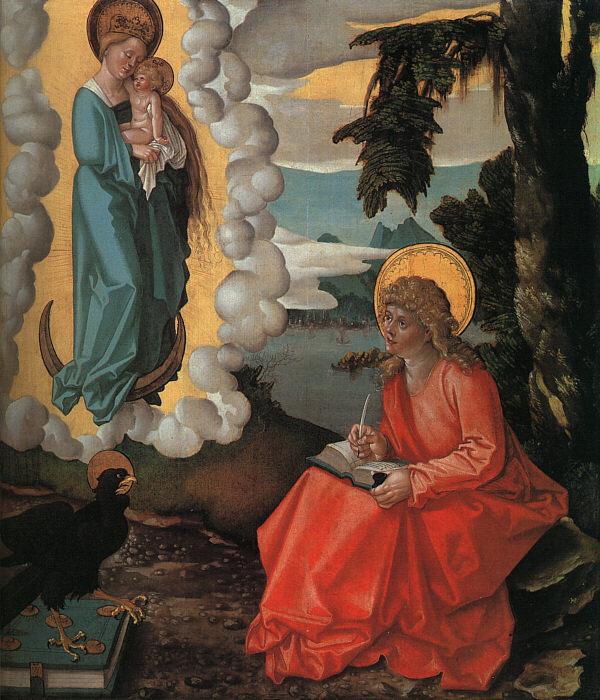
Lenten Homilies AD 2009 – The Scriptures
5th Sunday of Lent – The New Testament
In this the final homily of this series on the Scriptures we consider the New Testament. All the books that have been written about the New Testament and on the Life and Work of the Lord Jesus Christ cannot possibly be encapsulated in a Sunday morning Homily, but a little information will, I hope, light our way.
As with the Old Testament there are a variety of literary styles within the New Testament. There is history in the Gospels and in the Acts of the Apostles, there are Letters and there is the Apocalypse – also called the Book of Revelation.
5th Sunday of Lent – The New Testament
In this the final homily of this series on the Scriptures we consider the New Testament. All the books that have been written about the New Testament and on the Life and Work of the Lord Jesus Christ cannot possibly be encapsulated in a Sunday morning Homily, but a little information will, I hope, light our way.
As with the Old Testament there are a variety of literary styles within the New Testament. There is history in the Gospels and in the Acts of the Apostles, there are Letters and there is the Apocalypse – also called the Book of Revelation.
This morning’s Homily will attempt to be a small guide to some of the aims and objectives of the writers who the Church believes wrote as they were guided by the Holy Spirit.
The first and most important thing to understand about the New Testament is that the various writers are concerned first and foremost to teach us about Jesus. The Lord is at the heart of the New Testament – without him it would not exist.
So how did it come about? St Peter, St Paul and the other apostles began their public ministries following on from the events of Pentecost. As we know at first this was confined to the Jewish people, but then two events brought about a very radical change. Firstly, the conversion of Saul, who becomes St Paul, on the Damascus road, and, secondly, St Peter’s vision at Joppa (Jaffa) of the sheet with the unclean animals and God telling him to “rise, kill and eat” along with the Lord’s instruction to him to go to the house of the Roman Centurion Cornelius where he sees the faith of Gentiles who believe in Jesus and when he prays for them he sees the Holy Spirit come upon them as he had on the Apostles at Pentecost. This leads Peter to report to the Church at Jerusalem on what he had experienced and the Church Council in Jerusalem declares: “Then to the Gentiles also God has granted repentance unto life.” Following on from this Barnabas and others begin preaching to Gentiles in Antioch and Paul is invited to join them such is the response. Paul and Peter in differing ways then have an apostleship among the Gentiles.
The first and most important thing to understand about the New Testament is that the various writers are concerned first and foremost to teach us about Jesus. The Lord is at the heart of the New Testament – without him it would not exist.
So how did it come about? St Peter, St Paul and the other apostles began their public ministries following on from the events of Pentecost. As we know at first this was confined to the Jewish people, but then two events brought about a very radical change. Firstly, the conversion of Saul, who becomes St Paul, on the Damascus road, and, secondly, St Peter’s vision at Joppa (Jaffa) of the sheet with the unclean animals and God telling him to “rise, kill and eat” along with the Lord’s instruction to him to go to the house of the Roman Centurion Cornelius where he sees the faith of Gentiles who believe in Jesus and when he prays for them he sees the Holy Spirit come upon them as he had on the Apostles at Pentecost. This leads Peter to report to the Church at Jerusalem on what he had experienced and the Church Council in Jerusalem declares: “Then to the Gentiles also God has granted repentance unto life.” Following on from this Barnabas and others begin preaching to Gentiles in Antioch and Paul is invited to join them such is the response. Paul and Peter in differing ways then have an apostleship among the Gentiles.

The inclusion of the Gentiles was a huge step for these Jewish men to take on board, but they clearly saw this as the will of God. So the Apostles journeyed with people to help them and they spread abroad the stories of Jesus and what he had taught and about his Birth, Life, Death, Resurrection and Ascension. In every place they visited they founded communities of believers and appointed bishops to lead them. The formation of the New Testament has its roots in these events.
As the Apostles travelled and taught people about Jesus naturally, there developed a desire for more information and knowledge about Jesus Christ who they had accepted as the Saviour. The life and teaching of Jesus formed the basis of their message, but this was informed by a greater understanding following the Ascension and Pentecost as the Apostles realised just what all they had seen and heard meant in terms of the fulfilment of the Old Testament prophecies regarding the Messiah, and most especially about Jesus human and divine nature. This developed into what we would call an “oral tradition.”
However, as time went on there was a need to write all this down for wider dissemination. This enabled the apostles to make sure that what was being taught about Jesus was what actually happened and not myths and invented stories. There were plenty of such strange things being said about Jesus and these were later to develop into a more organised system known as “Gnosticism” which led to deeply divisive developments in the 6th century. So one of the primary purposes of the Gospels and the Letters (or Epistles), was to ensure that the truth about Jesus was disseminated by eye-witnesses to what Jesus had taught and achieved (Luke 1:2) as opposed those who were not eye-witnesses and who were peddling strange myths and tales. Some of the authors were quite open about this, e.g. St Luke talks of writing “an orderly account.... that you may know the truth concerning the things of which you have been informed” (1:3-4). The rows in the church in Corinth and the false teaching that takes place in Galatia are examples of Paul’s determination that the truth of the Gospel should not be perverted by false teachers and that these Christian communities should not be led astray. In 2 Peter we read “So also our beloved brother Paul wrote to you according to the wisdom given him, speaking of this (in all probability this means the Second Coming of Christ) as he does in all his letters. There are some things in them hard to understand, which the ignorant and unstable twist to their own destruction, as they do the other Scriptures.”
Now this is a very general overview of the New Testament and I intend later in the year to give you some teaching on each of the four Gospels and at another time some teaching on the Epistles. However, I do want to say a few words about the Book of Revelation this morning before considering it more thoroughly later in the year, because in many ways this has become a book that has been most misused by many groups and individuals to teach all manner of strange things. Firstly, it is not full of condemnation of the Roman Catholic Church and does not show us that the Pope is the anti-Christ as some extreme protest-ants falsely claim. In reality it appears to have been written to the persecuted Church in Rome which was suffering horribly under the persecution led by successive Roman Emperors’. If you want to know more then read a good introduction to the Book and many clergy, myself included, would recommend “The Lamb’s Supper: The Mass as Heaven on Earth” by The Rev’d Doctor Scott Hahn, published by Darton, Longman and Todd. Fr Hahn also shows us that the key to understanding the book is the Mass.

The New Testament is the record of the how God finally reveals himself completely in Christ to the peoples of the world and of the beginnings of the Church. It is the record of how God became incarnate, of how he stepped into time to achieve reconciliation with his people who had become separated from him, and of how he then included us Gentiles in that renewed People of God. The pages of the New Testament, like those of the Old, do not disguise the poor and sometimes appalling response of the People of God, but through it all we see that God loves us and longs for us to come to know him the only true God, to know the redemption that he offers us through his Son, and the continued sanctification he longs to bring about in our lives through the work of the Holy Spirit.
As we read our Bibles let us always recall that ultimately these pages are written that we may come to know Jesus and the reason for his incarnation.




No comments:
Post a Comment